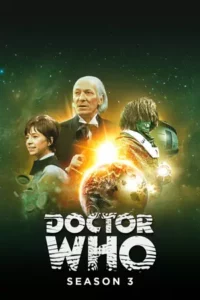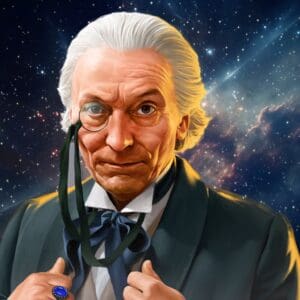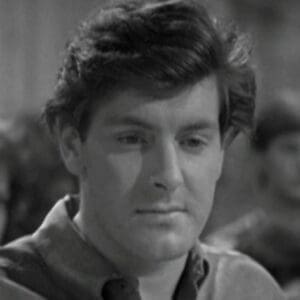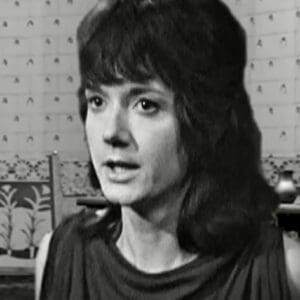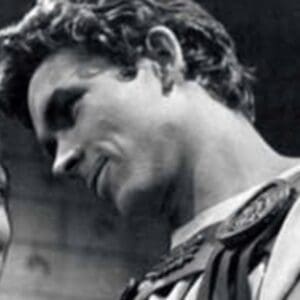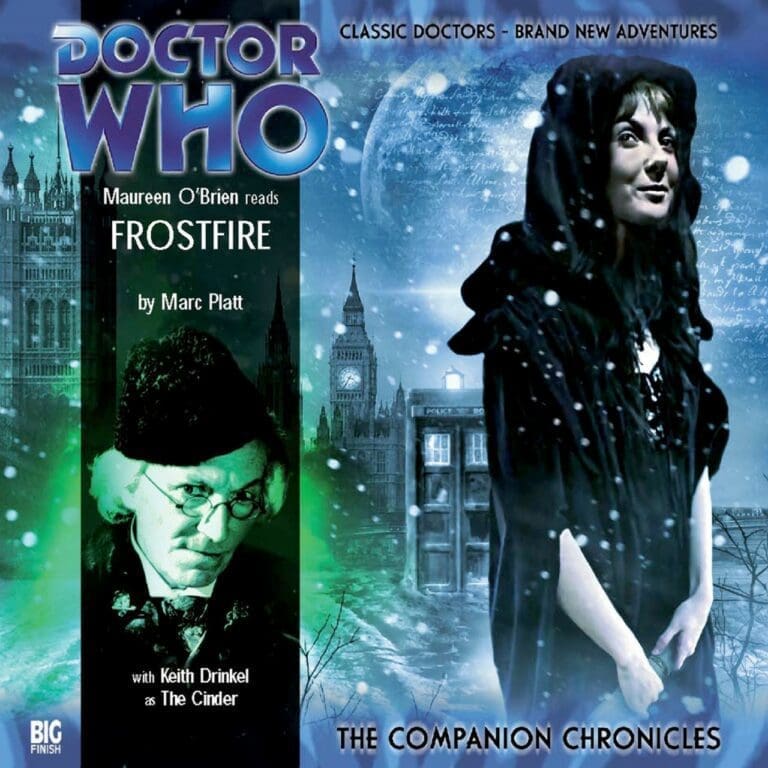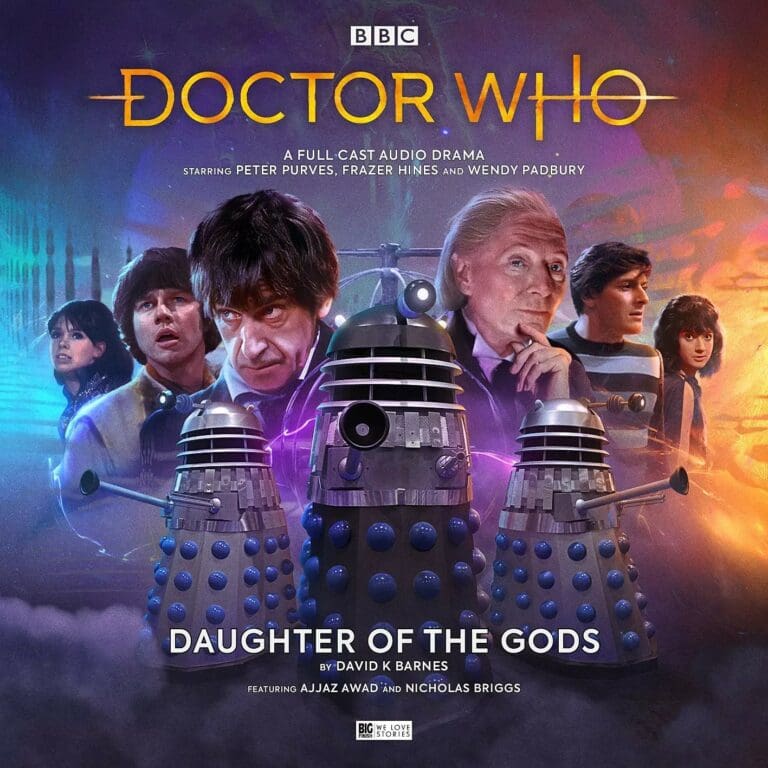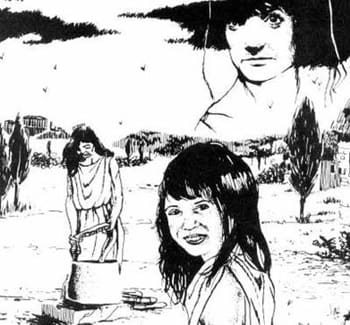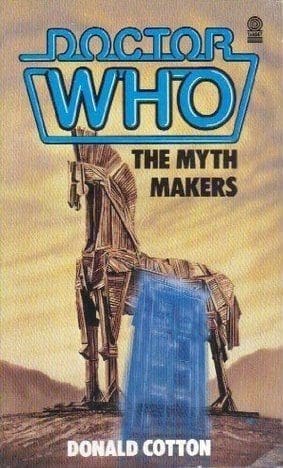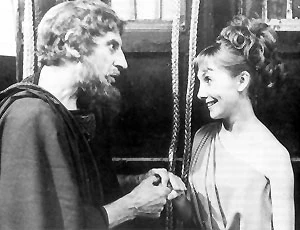
Classic Who S3 • Serial 3 · (0/4 episodes intact)
The Myth Makers
Other variations of this story: The Myth Makers (BBC Audio Soundtrack)
Reviews and links from the Community
This review contains spoilers
Review of The Myth Makers by Dogtor
“Well, between you and me, I don’t honestly enjoy killing at all”
C’est une transition vraiment intelligente.
Cotton fait ici de la guerre de Troie une farce, avec des héros qui ne sont que des crétins lâches coincés dans une guerre vaine et pourtant absolument atroce. Mais le départ de Vicki marque en plus une étape décisive mais au fond assez triste dans l’histoire de la série.
En fait, là où le script est fort c’est qu’il passe d’une comédie avec des dirigeants inutiles et des guerriers idiots à un vrai bain de sang.
Le dernier acte est terrifiant, mais en plus c’est comme si Vicki s’enfuyait de cette version de la série où la joie n’a plus du tout sa place.
Review of The Myth Makers by TheDHolford
“I think they’re doing more talking than they are fighting!”
Watched Loose Cannon Reconstruction.
An enjoyable story, despite the very lacklustre companion exit not working at all, and the introduction to the new companion coming out of nowhere in the closing moments. It’s a strange choice that doesn’t work for either character really.
Other than that though, the actual Greek vs Trojan story is actually really fun and enjoyable. Seeing the famous story played out on screen with the Doctor having accidental heavy involvement is great. There’s some great side characters and performances from the entire cast, and the story moves at a decent pacing too.
It’s a shame that this story is all missing, as it seems like it would be really fun to watch properly! Still, really enjoyed this!
This review contains spoilers
Review of The Myth Makers by Trench16
The Myth Makers: 8.9 - This episode was another really fun story. I thought the whole plot was just a fun romp and Steven as well as Vicki were both really good. The trojan horse was simply great and the Doctor being fed up with the greeks bs was hilarious. I thought Paris was also a good character and his arc throughout the story was nice. Steven pretending to be a Greek was also great and the fights, although they are missing, were really good.
This review contains spoilers
Review of The Myth Makers by 15thDoctor
So that's goodbye to Vicki, which is a real shame as it was only over the last few stories that I felt her character begun warming up. The Myth Makers is probably her strongest outing. I was enjoying her character development in the last couple of stories and felt she had finally moved beyond being Susan 2.0.
This story itself improved as it went along, with episode 4 being the peak, I liked the idea of the doctor coming up with the idea for the siege of Troy and jumping out of a wooden horse. I loved Vicki franticly searching through the TARDIS wardrobe looking through the variety of clothes trying to find something of the right period - great idea (just wish I could see the footage!!)
This story seems to be influential on The Fires of Pompeii, the TARDIS being used as a shrine, the priestess is very much like soothsayers. Seeing the two opposing sides in Troy is interesting, its impactful having Steven on one side and Vicki on the other.
This review contains spoilers
Review of The Myth Makers by Rock_Angel
Myth makers more like mother makers we get mother Cassandra being right we get ar mother katarina But we sadly loose a mother vicki she graduated mother school and we are all gonna miss her week exit for a strong character imo
This review contains spoilers
Review of The Myth Makers by Joniejoon
A story with a clearly strong script, but with several factors that hinder it from being perfect.
The Doctor, Steven & Vicki land in Ancient Greece and meet up with Odysseus, who is planning to invade Troy. Soon, they are split up, with Vicki on the Troy side, and Steven & the Doctor on the Greek side. So how will this mythical conflict play out?
First of all, there are two outside factors which hold this story back. The first one should be pretty obvious: It doesn’t exist anymore. This story is, apart from some vague screenshots and second-long clips, completely missing. This is the first time I’ve really come across that. Marco Polo was similarly missing, but at least some very clear screenshots, a fan-made recreation of episode 1 (look that up!) and a 99% faithful novelization. The latter being my pick for experiencing the story, as it captures the essence of it wonderfully.
This story does not have the same luxuries. So, for the uninitiated, let’s quickly go over the 3 main ways you could go about experiencing this story. The first is the Loose Cannon reproduction. These take the existing audio recordings of the episode and add screenshots and extra material to make the episodes as complete as possible. It’s normally a viable option, but since this story doesn’t have a lot of screenshots, it’s not as good as other recreations. Besides that, this recreation also doesn’t have a narrator who describes what’s going on. Instead opting for scrolling text, which is disappointing.
Your second option would be the BBC narrated soundtrack, narrated by Peter Purves. This basically contains the original audio for the episode, and does have a narrator over it who connects the scenes together. The clear downside of this one is, of course, that there are no visuals.
Your last option would be the Target Novelisation written by original writer Donald Cotton. This one also has an audiobook version read by Stephen Thorne. The upside for this one is that you have a clear, understandable story penned by the original writer. The downside is that there are clear changes from the TV episode, like the entire story being told from the perspective of Homer. You also miss out on the acting for this one, which was quite strong. Especially since we have a few important moments for our main cast.
For me, I swapped between option 1 and 2. I tried to listen to the narrated soundtrack, but found it hard to follow in places. Especially the last episode. So I watched that one in the reconstruction about halfway through. Why no one has made a definitive version by combining the narrated soundtrack and the reconstruction, is a mystery to me.
Anyway, enough of all that. On to the actual story. This story is a pure historical, and quite a creative one at that. Generally speaking, historicals in Doctor Who go one of two ways: They are funny, or they are dramatic. This one is a bit of a middle ground, while leaning a bit more to the funny side.
It has some great moments and interactions between the historic characters, which makes them very memorable. A standout being the scene where Steven convinces Troy soldier Paris that he should take him hostage, which leads to some fun, unearned pride on his side.
There’s also plenty of drama, though. The Doctor is forced by Odysseus to prepare a plan to attack troy. On the other side, Vicki is forced to prepare a plan to attack Greece. Steven is also in this story. Thrown in jail. I don’t know why you would expect anything else from him.
While this could’ve led to an interesting battle of wits between the Doctor and Vicki, the story seems to quickly chicken out and make it all look like a miracle on the Vicki side, so the Doctor can think out a plan and look smart. Bit cheap, really.
Still, the Doctor’s plan is fun on its own. He first dismisses the horse infiltration idea and considers it stupid. Instead, he thinks up a catapult to launch soldiers into Troy. The Greeks are on board and all is well, until they want to launch the Doctor as a test subject. After that, he changes his tune real quick and goes for horse infiltration. Great stuff from a comedy perspective. When they actually enter Troy, it becomes a story of trust, betrayal and violence. Which is great stuff from a dramatic perspective.
And that’s why it is a massive shame that this story doesn’t exist anymore: It is a combination of the two halves of history stories. It is both dramatic AND comedic, and the two sides strengthen each other. This was tried before in the Romans, but there the comedy side and the drama side clashed, thanks to the constant switching between the two. They don’t do that here. In this story, one leads to the other. The comedy banter in Troy builds up the characters, so we later feel the hurt when we see them defeated. The comedy leads to the Trojan Horse, which is used to start the entire attack. Comedy pushes every piece into place, so that the drama can land. I genuinely believe there is no other historical (until now) that has combined the two so well. That’s why it's a shame this story doesn’t exist: If it did, it could genuinely be my favorite pure historical for the way it knows how to strike a balance.
But there is one other factor I’ve kind of neglected to mention about this. And it is the other outside factor I mentioned at the start. When reading the script edit for this story, Maureen O’Brien found out she was suddenly being written off of the show. And that puts a damper on the final product. It’s integrated fine. Not brilliantly. A little lower than Susan, if I had to compare.
But the entire idea of her being written off here is a bit problematic with her character. She had established a familial relationship with the Doctor and Steven. At the same time, both TV and the audio’s have pushed her even further by exploring her relationship with loss and her fear of being left behind. Yet, at the same time. In this story she’s suddenly decided to leave that family all behind. It undermines her bonds and growth in the ways it is presented. And I want to make clear: It is not only the audio’s that have pushed her this far, TV episodes very clearly had the same intention. To throw all that in the bin in what amounts to 5 minutes, is a disservice.
And yet I still love this story. While the decision was made for her, Maureen O’Brien clearly pushes it as far as it can go. Still leaves a mark on the show, even within the limitations the writing put on her. Massive props for her.
But yeah, how do I go about judging this? This story doesn’t exist, had some bad forced decisions, but its actual excellence still shines through and it achieves something other historicals never did as well. I’m torn. It’s like judging the lettuce that has fallen out of your Big Mac.
But dangit, it’s good lettuce. From what is shown, everyone very clearly tried. If this story is ever animated, or better yet, found, I’ll look at it thoroughly. Until then, I’m going to give this an 8 for all that was accomplished. Circumstances be damned.
This review contains spoilers
Review of The Myth Makers by deltaandthebannermen
The Myth Makers is an odd fish. It’s one of those lost stories that, due to the lack of photographic record, fans know very little about. We have the soundtrack and the odd photograph, but nothing substantial enough to get a proper feel for the story – at least not in the same way as other lost stories, such as Fury from the Deep or Marco Polo.
I first became acquainted with this story through the Loose Cannon reconstruction. At the time, I loved it. It was exciting to finally be ‘watching’ a story that I knew little about and Loose Cannon have done a wonderful job bringing to life a story which has very little surviving material. It evens includes the grainiest, murkiest clips that I’ve ever seen for any Doctor Who story and specially filmed shots of a wooden horse.
This time round, however, I watched the reconstruction whilst listening to the superior recording of the soundtrack courtesy of BBC Audio. The repeated use of the same four or five photographs, along with shots taken from stories such as The Romans and non-Doctor Who serials like I, Claudius works really well for about one episode. It then starts to grate and by the time I reached episodes 3 and 4 I gave up on the reconstruction and simply listened to the remaining audio. It’s a shame that they couldn’t find some ‘greekier’ shots to stand in for certain characters as the Roman aspects are obviously Roman and therefore don’t quite work. That said, it is an admirable effort and one that I did end up revisiting when I watched through the Hartnell era with my eldest child.
The story sees the Doctor, Steven and Vicki arrive on the plains of Asia Minor near the city of Troy whilst it is besieged by Greek troops vowing revenge for the kidnap of Helen. Interestingly, Helen never appears in the story and after the initial couple of episodes is never mentioned. The Doctor is mistaken for Zeus, Steven pretends to be Diomede, a dead Greek soldier, and Vicki is renamed Cressida by the Trojans and lauded and denounced equally as a prophet and a sorceress. And that is, really, it. The Doctor spends most of the story avoiding coming up with the wooden horse as a means of invading the city – only to fall back on the scheme when all else fails; Steven gets captured by the Trojans and released by Vicki only to be wounded in the ensuing battle and Vicki falls in love with Troilus, a young Trojan prince, and remains behind when the TARDIS leaves.
The Myth Makers is well known amongst fan circles for being ‘a comedy’. Dennis Spooner, who penned The Romans (another comedy which this marathon will soon experience) returns to give humorous lines to more historical characters. However, it’s really only Paris who is given the funny stuff and Barrie Ingham plays him very much as a comedic character – even delivering slightly duff lines like ‘it’s too late to say whoa to the horse’ with committed aplomb. Frances White is saddled with wailing and moaning as Cassandra and Francis de Wolff as Agamemnon and Ivor Salter as Odysseus spend most of the story being gruff, macho and occasionally sarcastic at either the Doctor’s, Steven’s or (Agamemnon’s brother) Menelaus’ expense. William Hartnell seems to do very little and isn’t given very comedic material and with Steven manning up as Diomede and Vicki telling everyone she’s from the future, the regulars don’t really seem as strong as usual.
There are also some very odd pieces of dialogue for a family show, not least Odysseus’ simile involving an orgy!
The addition of Katarina to the TARDIS crew at the close of the story is also very odd. Without visuals it is impossible to know if Adrienne Hill, the actress, features in any scenes in the first 3 episodes, but the first we hear of her on the audio is in Episode 4 when suddenly, Cassandra starts giving her instructions, followed by Vicki asking her to look after Steven.
As a potential companion, she is given no character aside from being Trojan and a handmaiden. Unsurprisingly she believes the TARDIS is taking her to the afterlife and the production team quickly realised that her character was unsustainable as a companion blaming her historical naivety and the difficulties that would cause writing for her in stories taking place outside of her realm of experience.
Personally I think the problem was more an underwritten character – she is little more than an extra judging by the number of lines she has in Episode 4. Historical companions can work, as Jamie proves in very next season, and indeed as we Big Finish proved with Erimem. Had Katarina been introduced from the beginning, maybe as a friend to Vicki – something akin to Ping-Cho’s relationship with Susan in Marco Polo – then she could easily have worked.
The historical aspect of the story comes through strongly with a large cast of Greek and Trojan characters as well as ‘off-screen’ characters such as Helen and Aeneas. The siege of Troy is a well known story and the Doctor posits the idea that the wooden horse ploy was probably made up by Homer when he wrote the tale down. Of course, it is the Doctor who comes up with the idea of the horse, having read about it in Homer, giving a neat little paradox for us to ponder. That said, it’s possible the Doctor meets Homer in the future and tells him about the horse, so maybe it was the Doctor’s idea all along! (And indeed, the novelisation of the story inserts Homer into events).
The final battle is, at least on audio, well realised with lots of swords clashing and screaming. The lack of visuals is a shame as I would love to see how this massive event was depicted on screen. I imagine that my imagination is somewhat better than reality.
How much of this ‘history’ is true is questionable, particularly due to the comedic nature of the story, but it definitely fits with the early serials historical remit and visits a period of history that is familiar to most people, if only through myth rather than historical fact.
A story that has potential but maybe doesn't for me, realise it all.
External Reviews / Opinion pieces
Doctor Who: Alternative Seasons - Season 3: State of Decay
Submitted by Joniejoon
1184 BC: The Myth Makers – A History of the Universe
Submitted by deltaandthebannermen
Community Ratings
(Updates coming soon:)
Add the last X members who rated it here
Add number of Favs, and who they are, here
